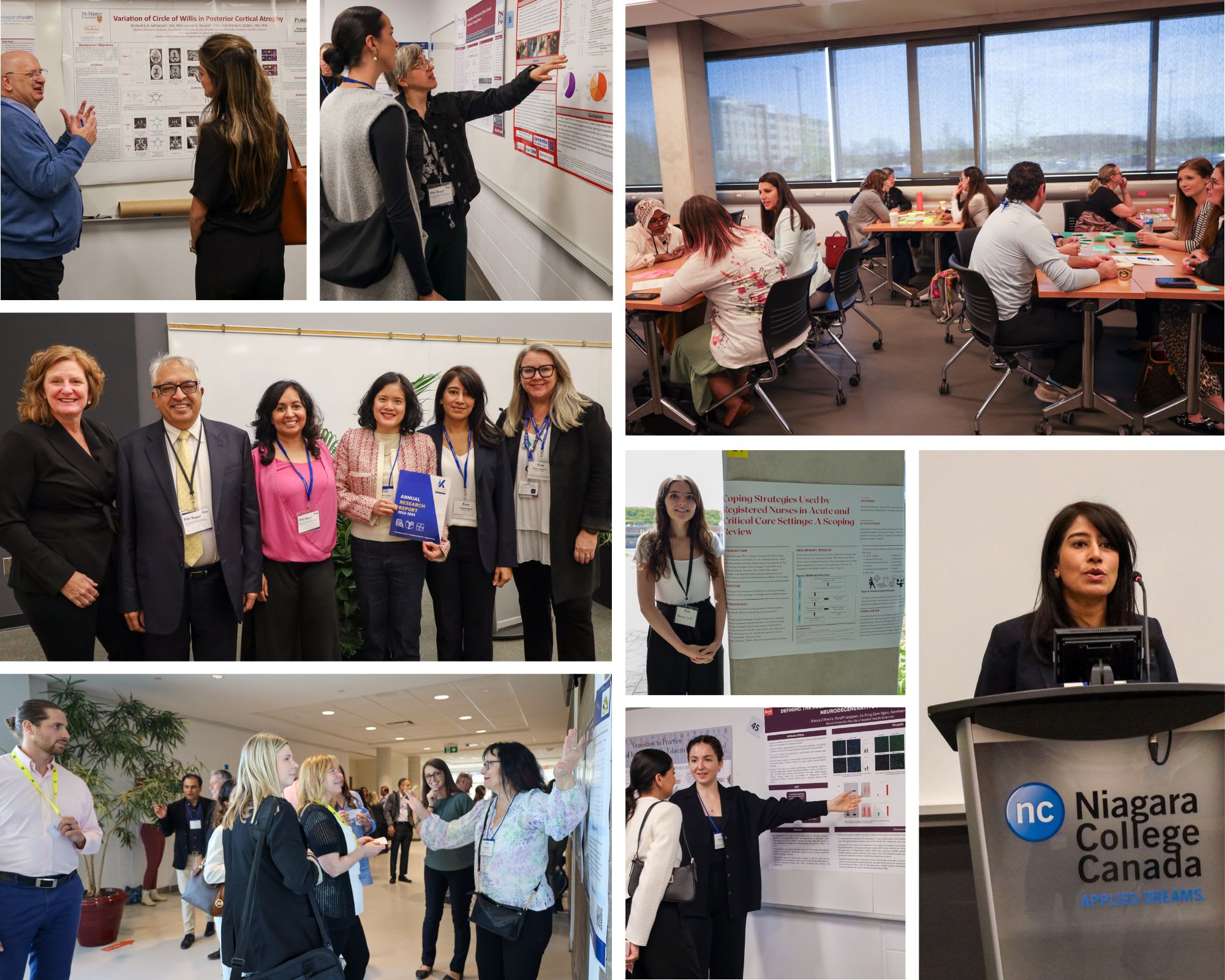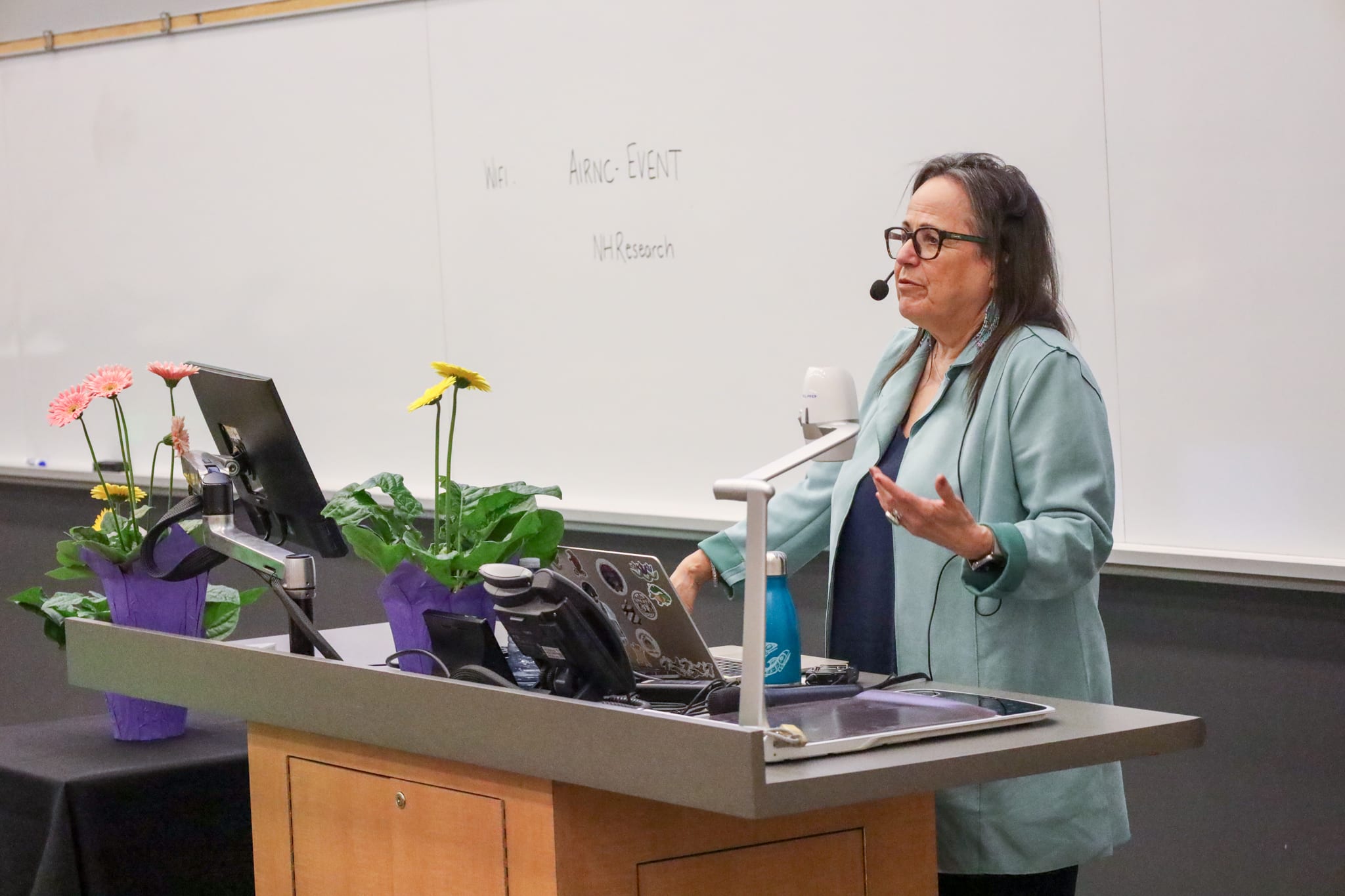
Researchers, learners, community members, physicians and staff gathered last week at Niagara College's Daniel J. Patterson in Niagara-on-the-Lake for the fourth edition of the Niagara Health Knowledge Institute Research Day.
Bernice Downey is often met with silence after she presents her research at a conference.
The Associate Dean of Indigenous Health at McMaster University calls the reaction “a colonial moment.”
Audience members might be nervous about asking the wrong question or offending her in some way, Downey says.
But another reason is their opinion of the scientific evidence she uses in her findings, Downey told the 165 researchers, learners, community partners and staff gathered at Niagara Health Knowledge Institute (NHKI) Research Day, held at Niagara College on Friday.
“I find that scientific researchers are looking for the gold standard, quantitative research that’s based in what they feel are scientific methodologies (and it’s) very difficult to bridge that gap to qualitative research. In the past, that attitude was built on, ‘It’s narrative, it’s folklore, and it’s not really scientific enough,’” Downey said.
“There is a lack of understanding of what Indigenous ways of knowing are. So to me, that becomes a problem. When thinking about my research, (I wonder) is it going to have any societal impact at the end of this (Heart & Stroke Foundation - Canadian Institutes of Health Research) Chair (in Indigenous Women’s Heart and Brain Health) that I’m doing?”
Downey shared her experiences during the keynote address at Research Day, where the theme was inclusion of equity-deserving groups in research.

Bernice Downey, Associate Dean of Indigenous Health at McMaster University, and Heart & Stroke Foundation - Canadian Institutes of Health Research - Chair in Indigenous Women’s Heart and Brain Health, gave the keynote address at Research Day.
Reconciliation Pathways: Opportunities for Institutional Allyship
In her talk, “Reconciliation Pathways: Opportunities for Institutional Allyship,” she urged her fellow researchers to recognize that Indigenous knowledge is valid in science. In fact, she noted, the United Nations calls for the right to respect of both Indigenous knowledge and practices in its Declaration on the Rights of Indigenous Peoples.
“So there’s this understanding and awareness that Indigenous Peoples are scientists in their own right,” Downey said. “There’s strong emphasis on evidence-based decision-making in health but… ask ourselves whose evidence, whose knowledge? Are we being respectful of the pluralism of the people we’re working with? There’s quality evidence that takes place within Indigenous populations and by Indigenous researchers. Indigenous science is … a way of seeing and knowing that’s dynamic, intergenerational and time-tested.”
This year marked the fourth edition of Research Day and the first anniversary of the NHKI, a milestone that was celebrated with the release of the NHKI’s inaugural annual research report, highlighting the achievements of Niagara Health’s prolific research division.
“Research is a team effort, and I am so proud of all our researchers and the work they do that will improve the standards of care in Niagara and elsewhere, while continually demonstrating the importance of community-hospital based research,” said Dr. Jennifer Tsang, NHKI Executive Director and Chief Scientist. “Their work is inspiring their peers at other Canadian community hospitals to engage in research and growing the body of knowledge that will benefit patients.”
Researchers representing eight different organizations attended the event. Research Day also featured 56 poster presentations, four oral presentations and four interactive workshops about how to facilitate healthcare research.
“This was one of best-attended Research Days and that speaks to the collaborative interest in improving healthcare in Niagara for all Niagara residents,” said Elaina Orlando, Niagara Health Research Manager and Research Day organizer. “Dr. Downey also gave a moving and insightful talk on reconciliation research and institutional allyship that we can all take back to our respective organizations and put into action in the work we do every day.”
Research Award winners announced
Research Day also celebrated the accomplishments of two Niagara Health researchers. Dr. Danielle de Sa Boasquevisque was presented with the Medical Staff Association Physician Research Award, and Leanne Kent won the Dr. Johan Viljoen Staff Research Award.
Dr. de Sa Boasquevisque, a stroke neurologist at the Niagara Falls Hospital, earned the honour for starting the neurology research program last year, making it the first research program to be based primarily out of the Niagara Falls Hospital and the first to serve Niagara Health’s acute stroke patients. In the last nine months, she has set up the first stroke study for Niagara patients, ENRICH-AF, a global study evaluating whether the drug Edoxaban is superior to standard medical therapy in preventing strokes among high-risk patients with an irregular heart beat and previous bleeding in the brain. This will transform care for stroke patients in the Niagara Region and is already recruiting patients.
Meanwhile, Dr. de Sa Boasquevisque is also in the process of initiating up two additional stroke studies and exploring the feasibility of several more.
Kent, Stroke Program Manager, is co-leading a structured and comprehensive quality improvement project that has the potential to positively impact many of our stroke patients by improving efficiency in their care and improving communication among the team.
Kent has also been an ardent supporter of the neurology research program’s launch. She has advocated for space and resources, and participated in site selection visits and feasibility assessments. She also facilitated a key quality improvement project for the regional stroke program to improve hyper-acute care by reducing door-to-needle times for thrombolysis and reducing "door-in, door-out" times for endovascular therapy.

